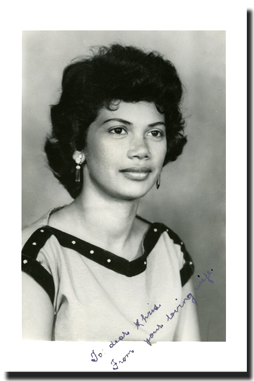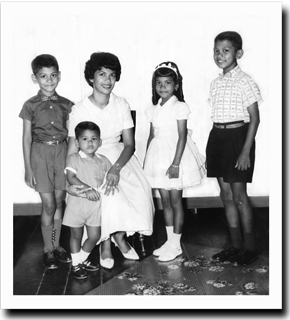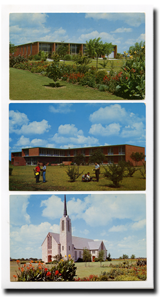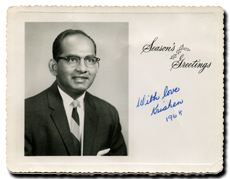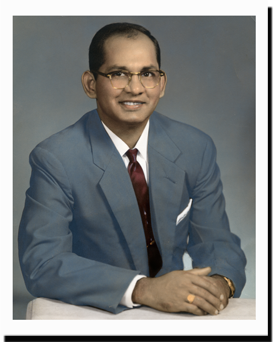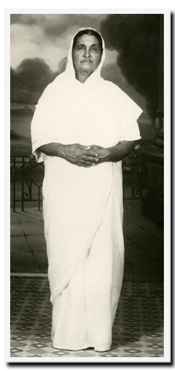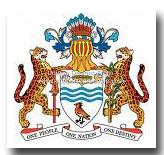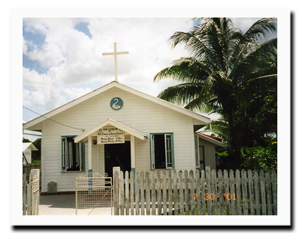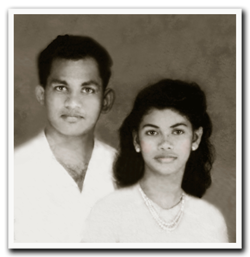
|
- a dedication to a good and faithful servant
The Early Years I was born on March 26, 1931 at Bath, Guyana, South America. My parents, being Hindus and descendants of the Brahmin caste, felt that I would one day become a Hindu priest, so three days after my birth my father named me Krishen after the god Krishna. My parents were very pleased to have a new son because a year before my birth, a brother and a sister died; so my coming into the world removed some of their grief and they were quite sure I was a reincarnation of my brother, Premchand. Since I was the only baby in the family at the time, my mother nicknamed me “Better Boy.” Both my maternal and paternal grandparents were born in India, members of the Brahmin Caste. They accepted the invitation of the British Governor in India to join the migration of Indians to British Guiana, a colony on the north of South America. These families were called to be Hindu priests to the Indians who were laborers on the British sugar plantations. When they first arrived, there were no established religions or schools. The Hindus built temples and established their own religion . My grandfathers were highly educated in Hinduism and very highly esteemed by the community. Every Hindu look to the priest for guidance and direction in their spiritual and social lives. Years later, the Anglican Church was established by the British and elementary schools came into being. Today, this former British colony is an independent nation and is called Guyana. In the Indian culture, marriages are arranged by your parents and you marry within your caste. There are no courtships or honeymoons. My mother was thirteen and my father was sixteen when their marriage was arranged by their parents. At the age of twenty-one my father, Rampersaud, was consecrated by the Hindu community as a priest (pandit). Prior to this time, he studied and served under his father as an assistant priest. My mother, Bahnathai, shared with me stories of my early life as a child. She recalled that I was the first child born in the new hospital on the sugar plantation. The midwife who delivered me was a black woman named Nurse Bobb. She wanted so much to be part of my life. But my grandfather didn’t care for the midwife. So nine days after my birth, my grandparents took me and my mother to their home. There were nine children in our family: six boys and three girls. Their names were: Baldeo, Ganesh, Deokie, Hari, Premchand, Sukdeo, Keolawanti, Dhanwanti and Dindial. Like all children, we had our little fights, but we respected and loved each other. Older brothers and sisters were always addressed as Brother Ganesh or Brother Nando or Sister Deokie. In our home, there was a special room set aside for worship. There were pictures on the walls and on the altar there were several idols. Each family member was responsible for an idol. Until I became old enough to properly worship and take care of my god, by brother assumed this responsibility. My father was the breadwinner of the family but there was no monthly paycheck. He was paid by individuals who requested his service. He helped arrange marriages, settle family disputes, perform religious ceremonies at the homes of people, meet with parents for the naming of a newborn child and much more. Because this income was inadequate to provide for the family needs, Dad did crop-farming and all the children were expected to work on the farm when they were old enough. Mother was the center of all life. She was the authority and disciplinarian at home and no one ever challenged her authority. Although she was uneducated, she made sure all her children went to school. She taught us that people are more important than things and that we must love and respect all people, regardless of their caste or ethnic background. She showed us that we have a responsibility given to us by God to help the poor and needy. She instilled in us a respect for life, in others and in ourselves. My mother was very devout and faithful to her family, her god and her community. Her life was one of prayer and service. My prayer life is patterned after hers. She prayed morning, noon, and night. As children, we expressed our love and gratitude to her by kneeling in front of her every morning with hands folded, saying “ Ram - Ram Matagi.” (I adore you my mother.) As I reflect on my parent's life, I am amazed at what they were able to do with such meager education and resources. They developed our thinking, shaped our attitudes, and equipped us for life. At the age of five, I was sent to the elementary school built by the Sugar Estate for the children of the community. As our family began to increase in number it became necessary for my mother to work in order to help pay the bills. This resulted in my staying away from school two days each week to take care of my baby brother and sister. Then, when I was twelve years old, my mother allowed me to attend the Lutheran Grade School that was about one block away from our home. Later, my siblings, Bebiah, Elsie and Basil joined me at St. Thomas Lutheran School. New Residence and Boyhood Days In 1949, my parents took up residence in Vryheid Village, West Canje, Berbice. This is a community with many Indians but no Hindu temple or priest, so my father was asked to be their priest. After we settled, my mother began to look for a school for me and my two younger sisters. In the next village was a school built by the Lutheran Church. The little building was used five days a week as an elementary school and on Sundays, it was converted into a chapel where church services and Sunday school classes were held. Since this was the only school in the area, my mom sent me and my sisters to that school My first day at the school was an unhappy one. I was short and fat so the bigger fellows called me “fatty.” I cried bitterly but was taken into the confidence of the Headmaster of the school, Mr. Alfred Williams, who also served as the lay pastor of the church. Two weeks later, the Headmaster told me that the school was built for Lutherans and if I wanted to continue attending, I must attend Sunday School. Because of this requirement, only forty children attended this school. On returning home, I told my parents that the Headmaster said I must go to Sunday School if I wanted to continue attending the elementary school. My father could care less. He suggested that I stay home and continue my studies for the Hindu priesthood, but my mother wanted me to have an education, so she visited the missionary pastor who said I could continue attending school without having to attend Sunday School. In St. Thomas Lutheran School, Christianity was spread with a whip. Yes, children were whipped by the Headmaster for not attending Sunday School. The fear of being whipped led me to sneak out of the home on Sundays to attend Sunday School. Although I do not encourage whipping, this opened the way for me to become a Christian. Interestingly enough, many years later, I was the one to discourage whipping at the St. Thomas School. Attending Sunday School meant many hardships. Sometimes I was whipped by my older brothers or my mother for going to Sunday School. Many a Sunday night, I went to bed without supper. However, I continued to run away to Sunday School, not because I believed in Jesus Christ as my Savior, but I preferred to be punished at home and not in school. I also wanted to learn to ride a bicycle. The Headmaster of the school would always allow me to use his bike before and after school. The Headmaster became a direct influence in my life and I still thank God for him. A significant incident took place one Sunday which probably helped to make me what I am today. It was the first Sunday of the month. On this Sunday, the missionary pastor would teach the Sunday School class. He told the story of Jesus healing a blind man with a touch. As I sat in the pew and listened to the pastor tell this story, my thoughts went to my father. That very day, many Hindus would come to him to be cured of their illness. I was not sure he always helped these people, yet they had to pay him in cash. This story troubled me all day, so I decided to tell Dad what I had heard in Sunday School. I asked him why he couldn’t do like Jesus did, heal people with a touch. Dad gave me no answer, so I said to him, “ I would like to become a Christian.” It probably was the wrong thing to say. Dad’s anger reached its highest point. He threw his plate of food through the window and said, “If you become a Christian, you cannot live here. When you accept the white man’s God as your God, you will have to live with them.” From this day on life became miserable for me. Every Sunday morning I was sent to work in my uncle’s coconut farm. Working on the farm all day prevented me from attending Sunday School, but whenever it was possible, I would run away to attend Vespers. After several years, my mother began to think in terms of sending me to high school. In Guyana, only elementary education is free. If a child wishes to go to high school, his parents have to pay his fees. Because of the cost involved, many children do not attend high school. I happened to be the only child in our family of nine children who attended high school. This is how it all began. The Lutheran Church in Guyana has its own high schools. In areas where there is no Lutheran high school, the church gives scholarships to Lutheran students. My mother became aware of this policy of the church, so she approached the principal of the school and told him she would let me join the church if it was possible for me to get a free high school education. After discussing the matter with the Pastor, the principal returned to my mother with the news that the church would be happy to give me a high school education. With this assurance, I began to prepare for membership in St. Thomas’ Lutheran Church. Easter Sunday, 1945, marked the beginning of a new life of joy and suffering. With a half-hearted consent of my mother and unknown to my father, I became a member of the church through adult baptism. This happy feeling was not of long duration. The news of my baptism soon spread. My uncle was the first person to take action against me and my family. He told my parents, “If one sheep goes astray, the rest will surely go, ” and he did all he could to prevent this. Because of his wealth and position in the community, my uncle influenced the Hindus not to accept my father as priest. We were living on his property, so he ordered my parents to leave as soon as possible. My father bore his suffering patiently and spent the rest of his life farming. My mother was more vocal with her anger. She lashed out at me many times and cried for years. Because of the pressure brought upon the family at that difficult time, I was asked to leave home. I wandered around for two days and would only return at nights to sleep under our house. My mother would tell people that I was not her son or that I was dead to the family. When the news reached the Headmaster, he came in search of me. While I stayed at his home, he tried to help my parents by securing a loan for them at one of the city’s commercial banks. With this loan, my parents bought a house. Two days later, I returned home and began working on the sugar plantation in order to assist in repaying the loan. After a years struggle in and out of the sugar plantation, the church came into the picture once again. I was sent to the Berbice High School in New Amsterdam and all my fees were paid by the Lutheran Church. My high school days came to an abrupt end when my mother decided I should go to work again. The church was willing to assist. With only two years of high school education, they offered me a position as the Assistant Teacher at St. Thomas’ Lutheran School. My salary was twenty dollars a month. This was always paid to my mother instead of me. I taught for four years, then accepted a call from the church to be trained as a lay preaacher. Accepting this call meant leaving my parents for good. In September 1950, I began attending the Lutheran Training Institute. While I attended this Institute to prepare myself for the ministry, I lived in the church’s dormitory for men, with ten young men who had also accepted the call of the church. At the end of our first year, the president of the church visited us and suggested that all unmarried men begin thinking about marriage. One of the requirements of the church was, all lay preachers must marry before they are assigned to congregations. It is felt that married preachers are more effective in the parish than unmarried preachers. Secondly, the Lutheran Church in Guyana centers its mission largely on East Indians. These Indians have inherited much from their ancestors who came from India, so parents are always suspicious of unmarried pastors and do not allow their daughters to attend church if the preacher is unmarried. Traditionally, the Indian marriage is arranged by one"s parents. My parents not only picked the wives for my brothers, but following marriage my brothers and their new wives were required to live with my parents, as was the custom, for a period of two years. This is called the training period. Since I was no longer living at home and not bound to the above stated rule, I decided to find my own wife. This was not too difficult. Living right across the street from the Lutheran Training Institute, on a street named Theatre Alley, was the Teekasingh family with two pretty girls. I said to myself, “In this home I will find a wife.” Not only were the girls pretty, but the entire family was considered by everyone around as a respectable Christian family. Father Harri Teekasingh was Lutheran and Mother Hannah Teekasingh was an Anglican and their children were members of the Anglican Church. Although they were Christians, Joyce's parents still held on to some of the old, Indian customs. Mr. Teekasingh was a very strict father who never allowed his daughters to walk on the streets alone, and considered it dangerous for girls to attempt to speak to young men.. The only way to get close to them was to befriend their older brother, Cecil. Soon it became known to the parents that their daughter Joyce and I were very interested in each other. Mrs. Teekasingh suggested that if I was interested in her daughter, then I should get her father’s permission before I could continue speaking to her. This involved writing a letter to Mr. Teekasingh seeking an interview and asking permission to marry his daughter. After meeting with Mr. Teekasingh several times to discuss the future of his daughter, he finally gave his consent to our marriage. It was not possible to marry while I was still a student, but during our engagement I was allowed to visit Joyce at her parent’s home. We were never allowed to go anywhere by ourselves, but would be accompanied by a brother and sister. On September 8, 1953 Joyce and I were married in the Anglican Church. Years later, when Joyce and the children went to live with her parents while I attended college, my parents visited Joyce and the children quite regularly. This formed a friendship between the two families. Commissioned as a Lay Pastor and Work At the end of two years of study under missionaries and pastors, the group of young men were commissioned as lay pastors and were sent by the church either to begin new work or to take over existing congregations. My first assignment was Ebenezer Lutheran Church of New Amsterdam. Ebenezer is the largest congregation in Guyana. It had a communing membership of 460. My work with this congregation was for a short period of time until a pastor became available. The work in Guyana is supported by the Evangelical Lutheran Church. Due to the shortage of pastors, the lay pastor assumed full responsibilities of his congregation with the exception of the administering of the sacraments. Once each month, a pastor visits the congregation and administers the sacraments. With the arrival of a missionary pastor, Rev. W.J. Wolff, in January 1953, who assumed duties as pastor of Ebenezer, I was sent by the church to work among the natives of the country who live in the jungles of Guyana. My assignment was not only that of a lay pastor, but I also taught school five days a week. Life in the jungle was interesting as well as dangerous. There were no roads and all traveling was done by canoes in the deep, wide Berbice River. There was also a shortage of food, since the Indian does very little farming. Once each week, my in-laws would send us a package of food. Soon after the arrival of this package, the natives would gather at our home and before the end of the day, the food was all gone. We learned much of the life and customs of the natives and we enjoyed working among them, but for health reasons, we were forced to leave for New Amsterdam. Since the church was not pleased with my decision, I was forced to resign. The early years of marriage were extremely difficult for both Joyce and I. We were angry with each other most of the time. I was responsible for the agonizing moments of our lives. I wanted to remake Joyce into the image I had of a preacher’s wife and at the same time, make her the daughter-in-law of a Hindu family that was so different from her own family upbringing. It was only when I recognized that I had to stop listening to my parents" criticism of my wife and let her be herself, that we began to live in a loving relationship. This was not very easy to accomplish. I was raised in a family where mother was the authority and you never say no to her, even after marriage. I listened to all she had to say, but never allowed her influence on me to affect my relationship with Joyce. (In a sense, I learned to shut my mother out.) Our love for each other has grown to the point that has created concern among our children that, when one of us dies, the other will have tremendous difficulty adjusting to being alone. Birth of a Son and a New Job Soon after resigning as a lay pastor, our first child, Michael Vishnu Persaud, was born, October 8, 1954. When Michael was born, we were introduced to a whole new dimension of family life - parenthood. We were excited, and, this led me to seek other employment. Although my salary as a theater manager was three times more than that of a lay preacher, I felt dissatisfied and uncomfortable with my new job. I then returned to the church and asked to be reconsidered for employment. Return to my Home Church - St. Thomas August 1954, I found myself once again enjoying my work as a lay pastor of Bethany Lutheran Church. Six months later, I was sent to my home congregation as a lay pastor and Headmaster of the school. This meant a lot to me, to be a lay pastor of the church in which I was baptized and to be a Headmaster of the school in which I was once a student. Coming to St. Thomas was a great challenge to me, as well as to the congregation. In this very community, my Hindu parents and other relatives lived. The members of the congregation knew my many problems. I was also conscious of the statements made by other officials of the church who were not too eager with my transfer to St. Thomas. “A prophet gains no honor in his own country.” A few Negro members of the congregation were not happy. Some said, “Why should a young Indian man be sent to teach us? We were born Christians and he became a Christian recently.” In spite of this opposition, I accepted the church’s challenge as a call from God to serve my people, fully confident that He would guide me. St. Thomas Church I spent five years at St. Thomas. They were years of rich, spiritual experiences for me and my family. During these years, we were blessed with two more children, another son Gordon Hari Persaud ,and a daughter, Patricia Devi Persaud. Each year, I was able to see the fruits of my labor. Many men, women, sometimes whole families of Hindus were brought to Christ. I especially enjoyed my work with the young people of the congregation. St. Thomas’ Luther League grew to be one of the outstanding Luther Leagues in Guyana. Today, I can look back with joy as I hear the young men and women of St. Thomas holding outstanding positions in both state and church. Some are now pastors in the United States. New Challenge In September 1960, I was asked to begin a mission congregation in Bath Settlement, the place of my birth and where my oldest brother was serving as a Hindu priest. At first, I said no, because I felt it would be difficult for both of us. The church finally convinced me to move to Bath. During this time another child was born, Peter. It was difficult to survive on the salary I made. I would have to take a loan on the following month’s salary just to pay the bills. The Hindu community was enraged with my presence in that community. We were shunned by the people. After several months, the neighbors allowed their children to play with ours. Gradually, we were able to visit with the neighbors and invited them to worship with us in our home. By the time I was ready to leave for the United States, there were thirty people of Hindu faith receiving instructions to become Christians. My College Years Soon after I became a Christian, my oldest brother came to visit me. We talked about the family and the hardships my parents were experiencing because of my decision to accept Christ as my Lord. I said to my brother, “I hurt because my parents are hurting and I love them dearly, but God has called me to a new and different life. I cannot do otherwise.” Then I said to him, “Someday I will go to the United States to study and become a pastor.” At the time, I had no idea how I would be able to do this, but in August 1961, I resigned as a lay pastor and went to Texas Lutheran College in Seguin, Texas. To be able to come to the United States, I sold all the furniture we had so I could pay for the plane ticket. My wife and four children went to stay with her parents in New Amsterdam. This was indeed a venture of faith. I had no money and Texas Lutheran College made no commitment of financial assistance, but I decided to come, believing that the Lord would provide for all my needs. In 1961, when I decided to come to the U.S., I had to leave Joyce and the four children. Joyce and the children moved in with her parents. We spent a lot of time planning and rehearsing. We shared all we could with the children to help them understand that Dad would be gone for four years and that they would have to live with Grandmother and Grandfather. We are thankful for Joyce's parents' patience and love. Without their help, we would have never fulfilled our dreams. Living with their grandparents was an experience that our children cherish even unto this day. During those four years I would send each child a letter every two weeks. The four years apart from my family were difficult for everyone. Gordon, my second child had a feeling that his Dad was gone and never coming back. He was stressed and had to see a doctor frequently. Finally, the doctor suggested that I write him a letter every day. It worked. Gordon felt better and looked forward to my daily letters. My four years at Texas Lutheran College were extremely difficult. I missed my family and financial needs were far greater than I thought. Many, many times, I locked the door of my dormitory room and cried for hours. I also talked to God, believing He was sitting there listening to me. Yes, I can say He made me strong and sent me back to my work and my studies. During the day, in between classes, I worked in the college bookstore and in the evenings I worked in the cafeteria and on weekends I preached in Lutheran congregations that needed a preacher for the weekend. By the end of my first year in college, I had a number of friends who helped me spiritually and financially. The college also provided me with grants and scholarships. Wartburg Seminary
During his first year at Wartburg, Donn convinced the officials at the seminary to help me achieve my goal. One morning, with the prodding of my wife, I went out seeking summer employment. I was offered a part-time job with the United States Embassy. Soon after I returned home to share the good news with Joyce, she greeted me with a broad smile and said, “Here is a letter from Dr. Ewald, the President of Wartburg Seminary.” It was filled with good news. “Please come to Wartburg Seminary. You have some good friends here who are willing to help you achieve the goal of becoming a pastor.” Two days later, another letter came from friends at Texas Lutheran College with plane tickets for the whole family to travel to Dubuque, Iowa. When members of the Persaud family and the Teekasingh family heard the news of our plans to return to the United States, they were very disturbed and sad. They felt we would never see each other again. One who felt deeply hurt was my mother. During the four years I had been away at college, my mother’s love for me seemed to grow warmer. She was excited when I returned home, but when I told her I was leaving, she cried for days. She begged me not to return to the United States. I said to her, “Mom, I love you, but this is God’s will for me and I cannot do otherwise.” My mother died in 1972, but before her death, I spent two wonderful weeks with her. As I was saying goodbye, we both knew that would be the last time we would see each other. We both had tears in our eyes and she held me and said, "you are the best son God has given me." My three years at Wartburg were a real challenge. We lived in the attic apartment of St. John’s Lutheran Church in Dubuque, Iowa. While there, I assisted the pastor on Sunday mornings with the service, teaching Sunday School and weekday confirmation classes. Many mornings, as I would leave for the seminary, my wife would say, “Can you bring something for supper? We have nothing in the refrigerator.” I never said a word to her, even though all I had was bus tokens. But the Lord always provided. We never went without food. When I share my story with people, they would say, “My, how you have suffered.” Yes, I suffered, but when I look at Calvary’s Cross, what I have endured is no suffering and what I do today is my humble way of saying, “Thank you, God, for dying that I might live. For I am not ashamed of the Gospel of Christ. I believe it is the power unto salvation and as long as there is life in me, I will tell the old, old story of Jesus and his love.” My Vocation I was ordained as a pastor of the American Lutheran Church on June 6, 1968 after accepting a call to serve as the Associate Pastor of Our Savior’s Lutheran Church in Osage, Iowa. We made a quick trip to Guyana to fulfill an immigration requirement of the American Government. This gave us an opportunity to visit our families and friends. On August 1, 1968, we arrived in Osage to assume my responsibilities as Associate Pastor. One of the first things I was asked by the congregation was, would I like to be called Reverend or called by my first name, Krishen.I said I preferred to be called Pastor. For me, being a Pastor means sharing and caring for God’s people and preaching and teaching the Word. I love people. They are a part of my daily life and the title “Pastor” helps keep before me my responsibilities to God’s people. I believe that I have answered the question on the development of my religious life in the account of my life. The person who really helped me in my early years was the Headmaster of my school, Mr. A.T. Williams. He was always there when I needed someone to talk to or needed some other kind of help. He encouraged me to pursue my goal of becoming a pastor. He had tremendous influence on my spiritual life. One thing Mr. Williams taught me that is still part of my daily life unto this day. He said, “Krishen, you must always call a spade a spade and a spoon a spoon. In other words, always tell it like it is,” and that’s the way it is in my life. On September 1, 1970, I accepted a call to serve as the pastor of Lost Island/Little Sioux Parish with residence in Milford, Iowa. Our ministry there lasted about two years. Six months after our arrival, I discovered that the former pastor’s salary was twice the amount of my salary, so I asked the church council why the big difference in salary. I was told that I am not white, therefore I do not need that much money. That response hurt me deeply. I contacted the bishop who was very caring and promised to find me a congregation that was not prejudiced. We accepted a call to Our Savior’s Lutheran Church in Sioux City, Iowa in May, 1972. This congregation was about to close its doors and members were encouraged to transfer to other congregations. But some members wanted to continue the ministry there even though the attendance was about 30 people each Sunday with the average age of 60. The good Lord blessed our ministry as both pastor and congregation worked well together. When God’s people work together, pray together and worship together, miracles take place. |
Click to view as pdf (larger print)
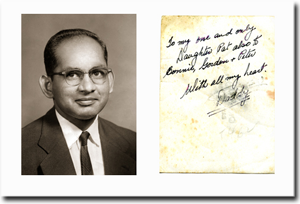
 Joyce and Krishen Persaud Christmas 2006.
Joyce and Krishen Persaud Christmas 2006.
(L to R: Mike, Pat, Peter, Gordon)

